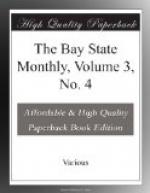“It means,” said they, “separation, and a Southern Confederacy. We will have our independence, and establish a Southern government, with no discordant elements.”
“Are you prepared for war?” inquired Butler.
“Oh! there will be no war; the North will not fight.”
“The North will fight. The North will send the last man and expend the last dollar to maintain the government.”
“But,” said his Southern friends, “the North can’t fight; we have too many allies there.”
“You have friends,” said Butler, “in the North, who will stand by you so long as you fight your battles in the Union; but the moment you fire on the flag the Northern people will be a unit against you. And you may be assured, if war comes, slavery ends.”
Butler was far too sagacious a man not to perceive that war was inevitable, and too sturdy and patriotic not to resist it. With a boldness and frankness which have shown themselves through his whole political career, he went to Buchanan; he advised and begged him to arrest the commissioners, with whom he was then parleying, and to have them tried for treason! Such advice it was as characteristic of Benjamin F. Butler to give as it was of President Buchanan to disregard.
II.
But the adoption of secession ordinances and the assumption of independent authority was not enough for the Cotton Republic. Though they hoped to evade civil war, still they never forgot for a moment that a conflict was not only possible, but even probable. Their prudence told them that they ought to prepare for such an emergency by at once taking possession of all the arms and military forts within their borders.
At this time there was a large navy-yard at Pensacola, Florida; from twelve to fifteen harbor forts along the Atlantic and Gulf coasts; half-a-dozen arsenals, stocked with an aggregate of one hundred and fifty thousand arms (transferred there about a year before from Northern arsenals, by Secretary Floyd); three mints; four important custom-houses; three revenue cutters, on duty at leading Southern seaports, and a vast amount of valuable miscellaneous property,—all of which had been purchased with the money of the Federal Government.
The land on which the navy-yards, arsenals, forts, and, indeed, all the buildings so purchased and controlled, stood, was vested in the United States, not alone by the right of eminent domain, but also by formal legislative deeds of cession from the States themselves, wherein they were located. The self-constituted governments of these State now assumed either that the right of eminent domain reverted to them, or that it had always belonged to them; and that they were perfectly justified in taking absolute possession, “holding themselves responsible in money damages to be settled by negotiation.” The Federal Government and the sentiment of the North regarded this hypothesis false and absurd.




